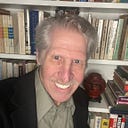The Fear Behind Book Banning
What motivates the people and organizations now actively banning books from schools and libraries?
Primal survival instincts drive us to do everything in our power to feel secure. We create a worldview or mindmap that makes sense of the world in ways that help us feel safe. Anything that challenges our worldview threatens our safety, and so we take action to protect ourselves.
When the way we subjectively make sense of the world does not match objective reality, if our minds are not open to changing, we may turn reactive and belligerent to enforce the worldview we depend upon for feeling secure. This is the reason for censorship.
The books now being banned often are the fiction and nonfiction works that most challenge our traditional views about gender and race.
The root of “sexism” and “racism” is that primal instinct which says we must be superior or dominant to survive. We see this most visibly in white men, like me, thinking we are better than other races, better than women or those outside binary gender roles. God forbid the human genome may evolve beyond alpha male rule!
Behind the urge for male dominance is the ancient human trait that I call “authority addiction.” This is the codependent compulsion to be a supreme leader or a faithful follower. Like any addiction, its characteristics feature denial of the dependency.
Banning books that promote the dangerous idea of equality for transgender people and people of color, therefore, is an attempt to preserve America’s historic cultural addiction to white male rule.
Anything that threatens our traditional worldview of what helps us survive is terrifying to those reliant on feeling better than others to feel good about themselves. Personal insecurity is the primal fear behind book banning.
From my perspective as a global thinker, the solution to book banning is seeing our universal oneness. Modern science says all existence is light. If we all are light being us, then we all are naturally equal. If we can accept our innate unity as a fact of life, we can let go of banning books that cause us to doubt our superiority or leave us feeling ashamed of our antics.
A global sense of life helps us outgrow the need to protect ourselves from feeling uncomfortable. We can stop shielding our minds from anything that might persuade us to make sense of life differently. We can let go of false beliefs that give us the delusion of safety.
Mind expansion is scary — and necessary. Rather than banning books from classrooms and libraries, I advocate teaching youth how to think, not what to think. Teach students about rhetoric, critical thinking, logical fallacies, propaganda tricks, and linguistics. STEM courses ably support workforce development and technology innovations, yet also teach civics, geography, history, sociology, literature, and liberal arts. A classical education, if made cross-cultural, helps prepare us to live free responsibly in democracies. The mind we save may be our own.
The choice to see our oneness within the greater whole releases insecurity in our hearts and minds. The choice dispels the energy for book banning.
Hope these ideas encourage you to take a stand for freedom of expression and the freedom to read during Banned Books Week.
Essay based on ideas in my book, Making Global Sense: Grounded hope for democracy inspired by Thomas Paine’s Common Sense
